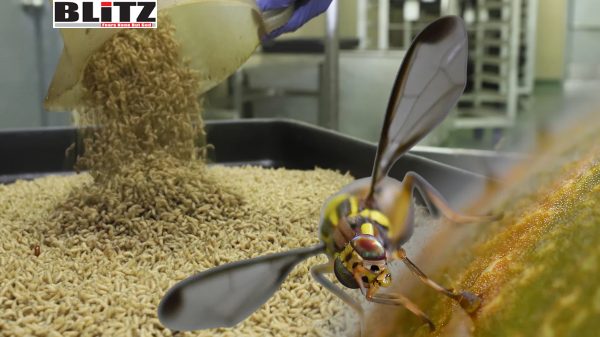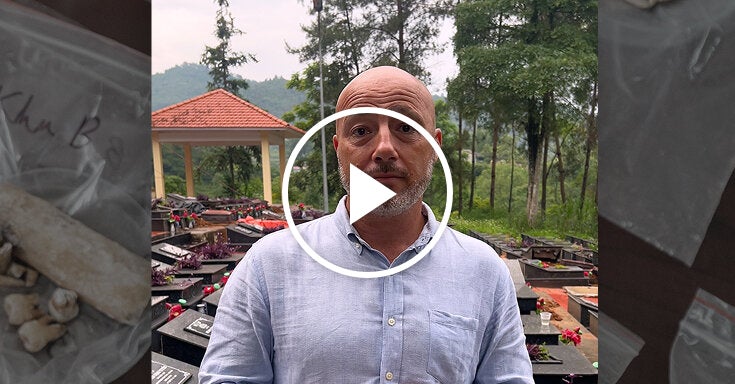US to deploy billions of sterile flies over Mexico and Texas to combat flesh-eating parasite
In a bold and unconventional effort to stave off a potentially devastating threat to its livestock industry, the United States is preparing to release billions of sterilized flies from airplanes over Mexico and southern Texas. The target of this aerial assault is the New World screwworm – a flesh-eating parasite capable of infecting and killing large animals, including cattle, deer, and even humans.
The initiative, reported by the Associated Press (AP), aims to control and ultimately eradicate the screwworm population through a process known as the Sterile Insect Technique (SIT). This involves breeding massive numbers of male screwworm flies, sterilizing them with radiation, and releasing them into infested regions. Once released, the sterile males will mate with wild females, but the resulting unions will produce no offspring, leading to a gradual decline in the fly population.
Unlike typical flies that consume dead or decaying tissue, the screwworm (scientific name: Cochliomyia hominivorax) is far more sinister. The female screwworm lays her eggs in the open wounds, or even mucous membranes, of living warm-blooded animals. Once hatched, the larvae burrow into the host’s flesh and feed on its living tissue, often causing agonizing infections and, in extreme cases, death.
“A thousand-pound bovine can be dead from this in two weeks,” warned Dr. Michael Bailey, president-elect of the American Veterinary Medical Association. The larvae’s appetite for live flesh means infections can quickly become fatal, especially in wildlife and livestock that may not receive immediate treatment.
Historically, the US and other countries in Central and North America had managed to eradicate the screwworm using SIT, with the pest largely confined to regions south of Panama for years. However, officials now warn that the parasite has reappeared in southern Mexico as of late 2024, sparking fears of a broader resurgence northward.
To prevent a full-scale outbreak, the US Department of Agriculture (USDA) has proposed a coordinated response involving the construction and operation of facilities specifically for breeding and distributing sterile screwworm flies. According to reports, the USDA will invest approximately $8.5 million in establishing a facility in Texas, and $21 million to convert an existing sterile fruit fly plant in southern Mexico into one tailored for screwworm fly production.
The objective is twofold: to ensure a sufficient domestic supply of sterile flies for the US and to help Mexico contain the spread before it crosses the border. The facility in Mexico is expected to begin operations by the end of this year, with full-scale breeding and distribution to follow in 2026.
The strategy has garnered support from entomologists and veterinary experts who praise SIT as an environmentally sustainable and highly effective pest control method.
“It’s an exceptionally good technology,” said Edwin Burgess, an assistant professor of parasitology at the University of Florida. “You can solve some kind of large problem without harming beneficial insects or ecosystems, unlike traditional pesticides.”
At the heart of the concern is the economic impact a widespread screwworm infestation could have on the US beef industry – a multi-billion-dollar sector already under pressure from climate change, international trade issues, and supply chain disruptions. A severe outbreak could result in the culling of thousands of cattle, extensive veterinary costs, and rising prices for meat and dairy products.
Moreover, screwworms do not discriminate between domestic and wild animals. Wildlife, particularly deer and endangered species like the Key deer in Florida, are highly susceptible to infestation, further complicating conservation efforts.
In fact, in 2016, an isolated outbreak of screwworms in the Florida Keys led to the deaths of nearly 135 endangered Key deer. That outbreak, which was eventually contained using sterile fly releases, served as a reminder of how quickly the parasite can become a national emergency.
The current resurgence in Mexico has been attributed to environmental shifts, increased movement of livestock, and possibly gaps in cross-border biosecurity protocols. Experts warn that without swift intervention, the parasite could migrate further north, requiring far more resources to combat once embedded in wild animal populations.
The new facility in Mexico will not only support US efforts but also serve as a critical frontline defense for the entire North American region. By producing and releasing sterile screwworms in southern Mexico, authorities hope to neutralize the threat before it can cross into Texas or other US states.
The US already collaborates with Panama in maintaining a long-standing sterile fly factory, which has been instrumental in holding the southern screwworm population at bay. However, with signs that the parasite is reestablishing itself in Mexico, the US is expanding its capacity closer to the source of the outbreak.
The USDA’s approach represents a calculated blend of science, diplomacy, and logistical coordination across borders. While the idea of unleashing billions of flies from the sky may sound like a plot from science fiction, officials insist that it is the most precise and sustainable option available.
As the USDA prepares for its first releases by summer 2026, the campaign will be closely monitored by agricultural watchdogs, environmentalists, and international partners alike. Should it succeed, it will serve as a powerful example of how modern science and cross-border cooperation can prevent ecological and economic disasters.
For now, the skies over southern Texas and northern Mexico may soon be buzzing with an unusual swarm not of pests, but of pest controllers. In the fight against the screwworm, it turns out that fighting flies with flies may be the best weapon we have.
Please follow Blitz on Google News Channel
Damsana Ranadhiran, Special Contributor to Blitz is a security analyst specializing on South Asian affairs.
us-to-deploy-billions-of-sterile-flies-over-mexico-and-texas-to-combat-flesh-eating-parasite
















Leave a Reply